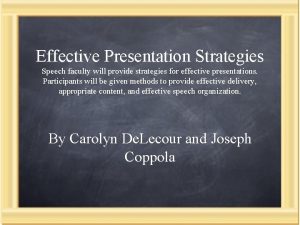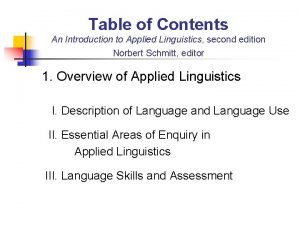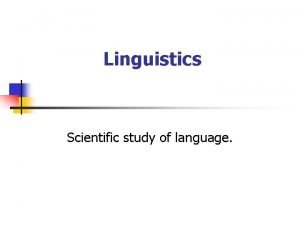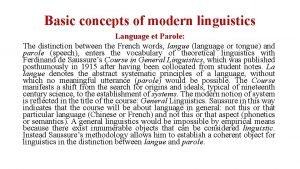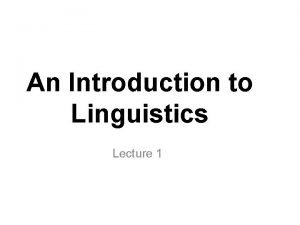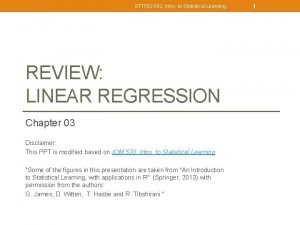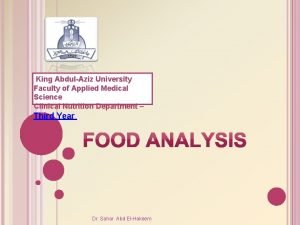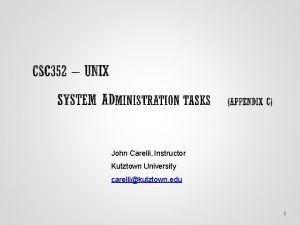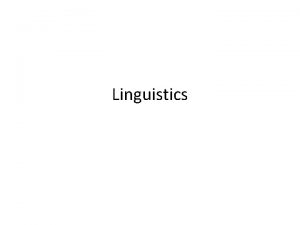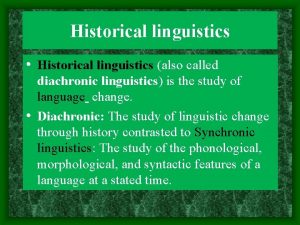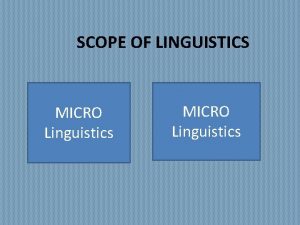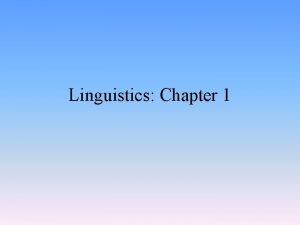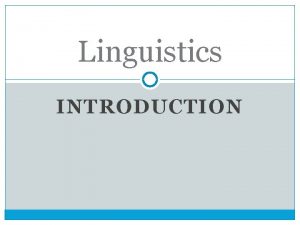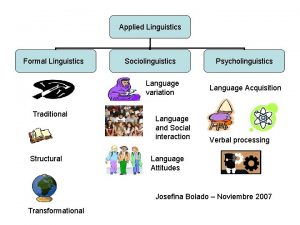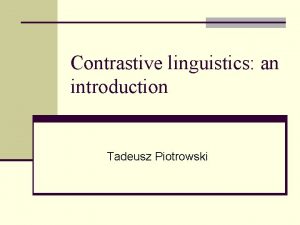Introduction to linguistics II FACULTY OF ENGLISH LANGUAGE









































- Slides: 41

Introduction to linguistics II FACULTY OF ENGLISH LANGUAGE AND LITERATURE G. TOGIA SECTION ΠΗ-Ω 02/11/2020

Today’s topics 2 Pragmatics: Introduction. Context. Deixis. Presupposition. You can study these topics in: George Yule: Chapter 11

Pragmatics INTRODUCTION. Course title: Introduction to Linguistics II

Semantics 4 When discussing semantics we focused on: the conceptual meaning of words and their relationships with other words within a conceptual domain.

Pragmatics 5 There are other ways of looking at meaning for which we need to consider: the context of the communicative event, the communicative intentions of the speakers.

Pragmatics: definition 6 Pragmatics is: The study of how people interact when using language. Language-in-use is a part of human interaction.

Pragmatics: an example 7 He waited by the bank. Is he really that kind? You should see her shop. Baby and toddler sale. How can context help us disambiguate the above?

Another example 8 So, how about a drink? Well, it’s getting a bit late. . .

More on Pragmatics 9 Pragmatics is the study of ‘invisible’ meaning. What is meant when it is not even said or written. To do this, speakers depend on shared assumptions and expectations.

Other examples 10 In a coffee shop: A: What coffee would you prefer? B: Black coffee.

Other examples 11 From a conversation between friends Mary: I thought she really liked your book. Alex: Yeah, you thought she did.

Other examples 12 From a conversation between friends: The man downstairs quite likes his music.

Pragmatics CONTEXT. Course title: Introduction to Linguistics II

What is context? 14 Context is a dynamic, not a static concept. Continually changing surroundings that enable the participants to interact.

Kinds of context 15 Linguistic context or co-text. E. g. the homonym bank. Physical context. E. g. the word BANK on the wall of a building in a city.

Physical context 16 Physical context is the overall setting in which the communicative event takes place as well as the culture of the particular linguistic community: Who is speaking? Who is being addressed? When does the interaction take place? Where does the interaction take place? What is being discussed? What is already known to speaker and listener?

Context: examples 17 Can you pass me the salt? Not a question about someone’s ability. Request. You are hurting my toe. Not making idle conversation. Asking to go somewhere else. What is the time? Might imply: ‘let’s get out of here’, ‘it’s time to go’, etc. Exercise 1

Pragmatics DEIXIS. Course title: Introduction to Linguistics II

Deixis and deictic expressions 19 Some common expressions in all languages which cannot be interpreted at all if we do not know the context, especially the physical context of the utterance: I, you, we, here, there, now, then, today, yesterday. E. g. You’ll have to call again tomorrow. Mary is not here today.

The deictic field Deictic expressions refer to a deictic field of language. Its zero point is fixed by the speaker, the time and place of utterance. Bühler (1934) called this ‘a deictic field’. The ‘I-here-now’ system: Who, where, when.

Person deixis 21 Words used to point to people: I, you, we. She he, it : only when their use is gestural. Some personal pronouns can point not only to an addressee but also to her/his social status with respect to the speaker: Social deixis: Εσύ/εσείς Tu/vous Du/Sie

Person deixis: examples 22 I am 80 years old. Do you like apples? Shall we go to the cinema? We-inclusive: includes the listener(s). We don’t want to go on strike, but you leave us no choice. We-exclusive: excludes the listener(s). She’s not the teacher, she is. Would Lady Jane like some more tea? Johnny will brush his teeth now.

Spatial deixis 23 Words used to point to a location: Here, this, that. This and that are both space and time deictic. The verbs come and go are also deictic: Encode movement towards or away from speaker’s location.

Spatial deixis: examples 24 This book is mine. I left it on that table. Professor Jones is here. Your suitcase is over there by the sofa. He just went out. John will come to the office tomorrow.

Temporal deixis 25 Words used to point to a time: now, then, this/that week/month, last/next week/month.

Temporal deixis: examples 26 She is writing a letter right now. She will come on Monday and I’ll see her then. I’ll see him this week. Where were you last month? Exercise 2

Pragmatics PRESUPPOSITION. Course title: Introduction to Linguistics II

Presupposition: definition 28 What a speaker assumes is true or known by a listener can be described as a presupposition. Presupposition concerns inferences related to the use of linguistic expressions but also affected by the context in which they are used.

Presupposition: examples 1 29 Did you eat the cheese? Presupposition: There was some cheese. Your brother is waiting outside. Presupposition: you have a brother. When did you stop smoking? 2 presuppositions: You used to smoke. You no longer do so.

The constancy under negation test 30 A test for checking for the presuppositions underlying sentences. It involves negating a sentence with a presupposition and checking if the presupposition remains true.

The constancy under negation test: example 1 31 Your dog is lovely. Your dog is not lovely. Presupposition: You have a dog.

The constancy under negation test: example 2 32 John doesn’t regret having failed the exams. John regrets having failed the exams. Presupposition: John failed the exams.

The constancy under negation test: example 3 33 You ate/didn’t eat the cheese. There was some cheese. I know/don’t know why she baked a cake. She baked a cake. My new bed is/isn’t comfortable. I have a bed.

Presupposition triggers: definition 34 Expressions which give rise to presuppositions are called presupposition triggers.

Presupposition triggers 1 35 Definite descriptions: John saw/didn't see the man with the balloons. Factive verbs: Realise, regret, know that, be proud/sorry/indifferent/glad/sad that, etc. John realized/didn't realize that his father was in debt. Presupposition: John’s father was in debt.

Presupposition triggers 2 36 Change of state verbs: Arrive, begin, come, enter, go, leave, continue, stop, etc. Mary stopped/didn’t stop smoking Presupposition: Mary had been smoking.

Presupposition triggers 3 37 Implicative verbs: Forget (‘ought to have’), manage (‘tried’), happen to (‘didn’t plan/intend to’), intended to. John managed/didn’t manage to open the door. Presupposition: John tried to open the door.

Presupposition triggers 4 38 Expressions of repetition: Again, another time, anymore, come back, repeat, restore. The stranger came/didn’t come again. Presupposition: The stranger came before.

Presupposition triggers 5 39 Expressions of temporal relations: After, during, whenever, before, as, since. We've lacked/not lacked a leader since Churchill died. Presupposition: Churchill died. Comparisons: Carol is/isn’t a better doctor than Barbara. The comparison triggers the presupposition "Barbara is a doctor”. Exercise 3

Summary 40 Pragmatics: The study of how people interact when using language. Linguistic context or co-text: the set of other words used in the same phrase or sentence. Physical context: the setting of the utterance. Deictic expressions: some common words which cannot be interpreted at all if we do not know the context. Presupposition: an assumption/inference created by the use of particular linguistic expressions.

Next week. . . 41 Speech acts. Direct and indirect speech acts.
 A concise introduction to linguistics answer key
A concise introduction to linguistics answer key Language
Language Relationship between linguistics and applied linguistics
Relationship between linguistics and applied linguistics Faculty introduction speech
Faculty introduction speech First steps in english linguistics chapter 8
First steps in english linguistics chapter 8 Introduction to language by george yule
Introduction to language by george yule An introduction to applied linguistics norbert schmitt
An introduction to applied linguistics norbert schmitt Cognitive linguistics: an introduction
Cognitive linguistics: an introduction The scientific study of language
The scientific study of language Definition of langue and parole
Definition of langue and parole Definition of language in linguistics
Definition of language in linguistics Signing naturally 2:9 answers
Signing naturally 2:9 answers Language and the brain in linguistics
Language and the brain in linguistics A level english language language change
A level english language language change University of split faculty of maritime studies
University of split faculty of maritime studies University of bridgeport computer science faculty
University of bridgeport computer science faculty Computer science tutor bridgeport
Computer science tutor bridgeport Alamo colleges salary schedule
Alamo colleges salary schedule Hahnville high school faculty
Hahnville high school faculty Importance of faculty in higher education
Importance of faculty in higher education Hubert kairuki memorial university faculty of medicine
Hubert kairuki memorial university faculty of medicine Http://www-bcf.usc.edu/~gareth/isl/advertising.csv
Http://www-bcf.usc.edu/~gareth/isl/advertising.csv Semmelweis university faculty of medicine
Semmelweis university faculty of medicine Penn state neurosurgery
Penn state neurosurgery Mercy faculty forward
Mercy faculty forward Faculty of medicine nursing and health sciences
Faculty of medicine nursing and health sciences Lee kong chian faculty of engineering and science
Lee kong chian faculty of engineering and science King abdulaziz university faculty of medicine
King abdulaziz university faculty of medicine Carelli kutztown
Carelli kutztown Mch fsu
Mch fsu Mendel university faculty of business and economics
Mendel university faculty of business and economics Electrical engineering umd
Electrical engineering umd Factors influencing faculty staff relationship
Factors influencing faculty staff relationship Nit calicut chemistry
Nit calicut chemistry Czech technical university in prague civil engineering
Czech technical university in prague civil engineering Ecu faculty manual
Ecu faculty manual Benha faculty of engineering
Benha faculty of engineering Singularity university faculty
Singularity university faculty Faculty of law maastricht
Faculty of law maastricht Medical faculty in novi sad dean
Medical faculty in novi sad dean Umn faculty dental clinic
Umn faculty dental clinic Sjsu faculty affairs
Sjsu faculty affairs



